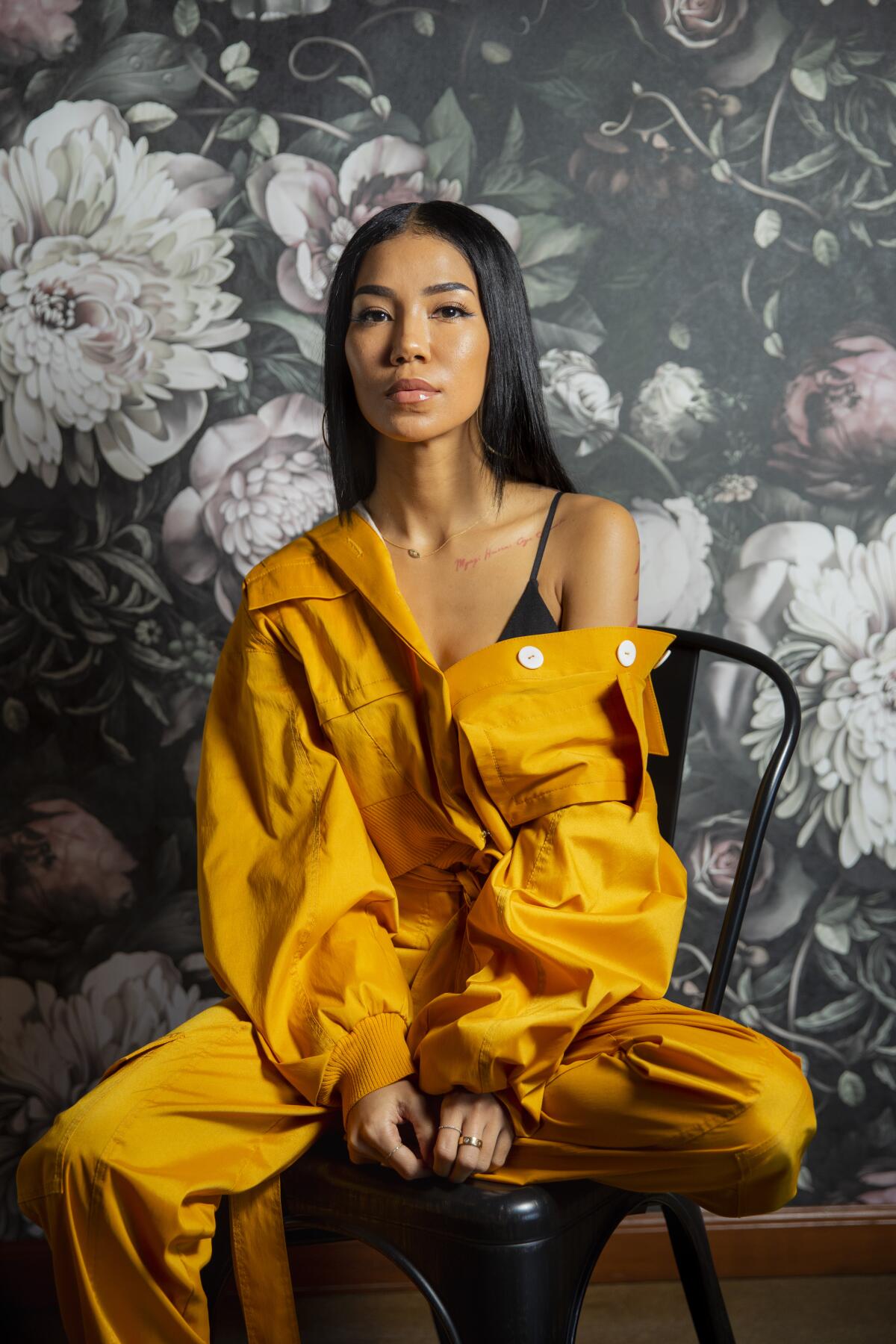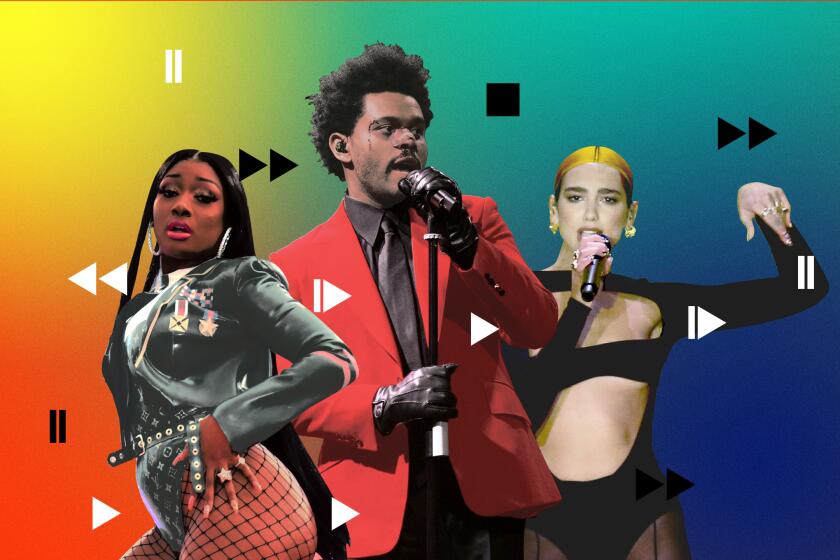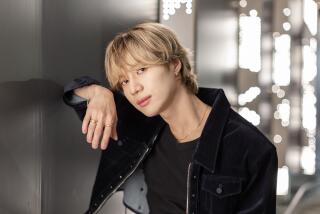With singing bowls for your chakras and slinky R&B, Jhené Aiko wants to heal you

Jhené Aiko was spending a few days in Carmel — a brief getaway from her home in Los Angeles — when her manager rang her cell with some pretty important news. Aiko had just been nominated for a pair of Grammy awards: her third album, “Chilombo,” received a nod for progressive R&B album, and “Lightning and Thunder,” her duet with John Legend, was up for R&B performance.
Aiko hadn’t been anticipating the call. In fact, she’d been asleep — just as she was when she got the call about her nominations back in 2014. Both times, her reaction was the same.
“I had to go back to sleep because I was, like, ‘What in the world?’” the 32-year-old singer-songwriter says.
This year, though, there was a second call, about 10 minutes later: “Chilombo,” whose title comes from Aiko’s original surname, also got a nod for album of the year — Aiko’s first non-genre nomination. “That woke me up,” she says with a self-deprecating giggle. “I mean they’re all good, but that’s a big one.”

Known for slow, confessional R&B shrouded in heavy reverb that’s hard to describe without the word “vibe,” Aiko has, for the last decade, steadily carved out her own intimate corner in a crowded post-“urban contemporary” field.
She came up alongside such hitmakers as Miguel and Tinashe; now, she’s more often surrounded by a new generation of unorthodox R&B stars, like Teyana Taylor, H.E.R. and Summer Walker. Yet her music has proved both popular and relatively trend-resistant and, especially recently, concerned with forces far greater than the Recording Academy.
“Throughout the years, so many people have come up to me and told me that my music has helped them get through things,” Aiko says. “So I wanted to put that intention of healing into the music so that it could be even more healing — you know?”
From homegrown jazz to furious punk to raw hip-hop recorded from prison, these 10 albums highlight L.A.’s creative spirit in a hard-scrabble year for musicians.
She explains “Chilombo”’s concept: sound healing, not simply in the conventional way we think about music as therapeutic but through a specific system of crystal singing bowls. When rung, they produce tones meant to resonate with listeners at a cellular level, tapping into different chakras (a theory of human anatomy familiar to anyone who’s taken a yoga class). Each track on “Chilombo” features different singing bowls, complete with a guide to which chakras they’re meant to activate that Aiko posted on her Instagram.
Though it may provoke skepticism in some less metaphysical music fans, learning about sound healing has been a lifelong process for Aiko — one that she approaches seriously and methodically. She studies with Jeralyn Glass, a musician and sound healer who also works with SZA; she even appeared at an event hosted by Glass last year, called Sacred Science of Sound. On “Trigger Protection Mantra,” a sort of sequel to “Chilombo”’s “Triggered (freestyle)” that reached No. 19 on Billboard’s R&B/Hip-Hop chart, Aiko goes fully New Age — her clear, light soprano unadorned by anything besides the endlessly ringing bowls.
Growing up around Baldwin Hills and Ladera Heights, she first encountered singing bowls as a teenager browsing in a local shop. “When I played one, I liked how it actually felt — the emotion of it,” she recalls.

By that point, Aiko had already ridden the music business roller coaster after being introduced as a sidekick to boy band B2K (the record label presented her, falsely, as a cousin of Lil’ Fizz) at the tender age of 12, and gotten off of it by choice in her late teens. Her parents were both interested in music. Her father, who is Black, Native American and German Jewish, pursued it as an amateur — he is a pediatrician by trade — and her mother, who is Japanese, Spanish and Dominican, did so professionally, managing Aiko’s older sisters in an R&B group called Gyrl.
When she decided to go for another ride after giving birth to her daughter Namiko at 20, it was entirely on her own terms. Starting with her star-studded self-released 2011 mixtape “Sailing Soul(s),” which featured Drake, a then-nearly unknown Kendrick Lamar and Kanye West, to multi-platinum singles “The Worst” and “Sativa” that she wrote herself, to, yes, the alternative medicine and holistic healing — it was all done Jhené’s way. Better yet, Jhené’s way worked.
“For me, getting into other ways to heal came from just years of like … self-medicating, probably,” Aiko says. “I would take something to go to sleep, if I was feeling sad that day. Or I would drink alcohol, or smoke weed. It was always a substance. I started to feel like my body was probably too sensitive to do these things that I see everyone else doing. What else can I do? I can meditate, I can exercise — and then when I discovered the sound healing, that was something that I could really get into, because, obviously, I do music.”
From Fiona Apple to Yves Tumor and a head-spinning assortment of artists and genres in between, these are, alphabetically ordered, our favorite songs of 2020.
“She’s always putting us up on health things,” says Brian Warfield, one half of Fisticuffs (Miguel, Mariah Carey), the production duo that’s been working with Aiko since that first mixtape and was behind the boards for much of “Chilombo.” Fellow native Angelenos, they initially met Aiko on MySpace; now they have their own studio in Culver City, not far from where Aiko grew up. “We’ll just be stuck eating vegan food, which is fine,” he adds, laughing.
More challenging were the logistics of recording and incorporating the singing bowls into otherwise fairly standard R&B instrumentation. A specialized engineer had to join “Chilombo”’s Hawaii recording sessions just to handle the bowls, which required four custom microphones each. “Originally each song was supposed to be for one chakra, but, obviously, the album has more than seven songs, so it kind of changed,” says the 36-year-old producer. “Whatever the chakra is, that was the key of the song all the way through.”

The result is an album that tackles familiar topics — relationships, mostly — with a fresh, sometimes almost imperceptible New Age tinge. “That’s what I think is really cool about the album,” Aiko says. “It’s not a meditation album, even though a lot of people tell me they meditate to it. It’s a mosaic of all these things that I am — all these different elements of storytelling and sound healing and therapy.”
Those elements have proved particularly important in 2020. “Chilombo” was released the week before the COVID-19 pandemic prompted lockdowns around the country. Though album promotion might have been even more grating than usual, she relished the time spent at home with her daughter and her boyfriend, rapper Big Sean. “Real relationship things happen regardless of whether you think people are celebrities or not,” she says. “It’s just normal.”
The Grammys, however, probably won’t be. “Is it gonna be Zoom? Is it gonna be a conference call?” she quips. Regardless of the medium, there’s a chance Aiko’s singing bowls might make it to primetime, which could be a perfect opportunity for the singer to do more of exactly what she intended to with “Chilombo:” Bring people a little peace.
More to Read
The biggest entertainment stories
Get our big stories about Hollywood, film, television, music, arts, culture and more right in your inbox as soon as they publish.
You may occasionally receive promotional content from the Los Angeles Times.












